Serving 322 students in grades Prekindergarten-8, Teachers College Community School ranks in the bottom 50% of all schools in New York for overall test scores (math proficiency is bottom 50%, and reading proficiency is bottom 50%).
The percentage of students achieving proficiency in math is 30-34% (which is lower than the New York state average of 46%). The percentage of students achieving proficiency in reading/language arts is 40-44% (which is lower than the New York state average of 49%).
The student:teacher ratio of 12:1 is higher than the New York state level of 11:1.
Minority enrollment is 92% of the student body (majority Black), which is higher than the New York state average of 60% (majority Hispanic and Black).
Quick Stats (2025)
- Grades: Prekindergarten-8
- Enrollment: 322 students
- Student:Teacher Ratio: 12:1
- Minority Enrollment: 92%
- Overall Testing Rank: Bottom 50% in NY
- Math Proficiency: 30-34% (Btm 50%)
- Reading Proficiency: 40-44% (Btm 50%)
- Science Proficiency: 30-39% (Btm 50%)
- Source: National Center for Education Statistics (NCES), NY Dept. of Education
Top Rankings
Teachers College Community School ranks among the top 20% of public schools in New York for:
Category
Attribute
Diversity
School Overview
Teachers College Community School's student population of 322 students has stayed relatively flat over five school years.
The teacher population of 27 teachers has grown by 28% over five school years.
Grades Offered
Grades Prekindergarten-8
(offers virtual instruction)
(offers virtual instruction)
Total Students
322 students
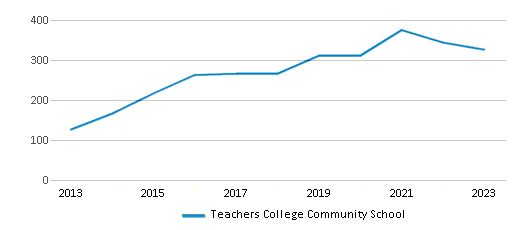
Gender %
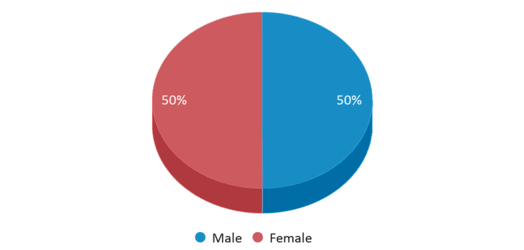
Total Classroom Teachers
27 teachers
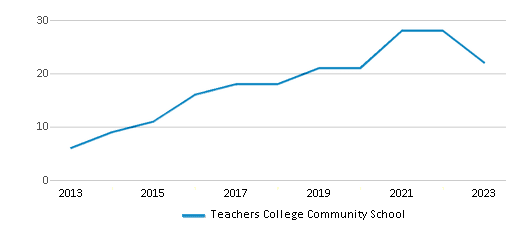
Students by Grade
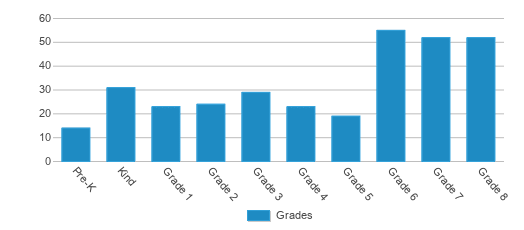
School Rankings
Teachers College Community School ranks within the bottom 50% of all 4,377 schools in New York (based off of combined math and reading proficiency testing data).
The diversity score of Teachers College Community School is 0.64, which is less than the diversity score at state average of 0.72. The school's diversity has stayed relatively flat over five school years.
Overall Testing Rank
#2808 out of 4377 schools
(Bottom 50%)
(Bottom 50%)
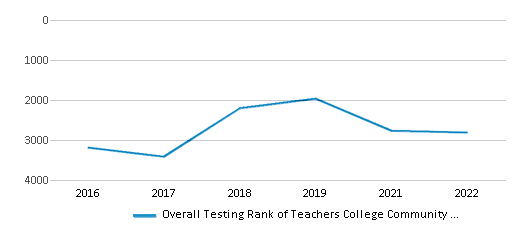
Math Test Scores (% Proficient)
30-34%
46%
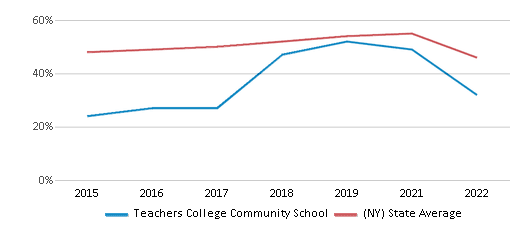
Reading/Language Arts Test Scores (% Proficient)
40-44%
49%
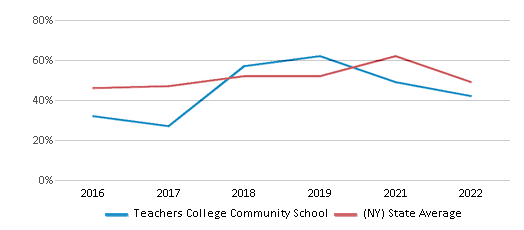
Science Test Scores (% Proficient)
30-39%
78%
Student : Teacher Ratio
12:1
11:1
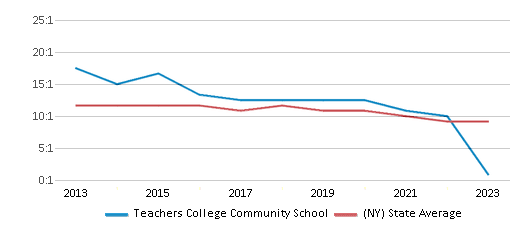
American Indian
1%
1%
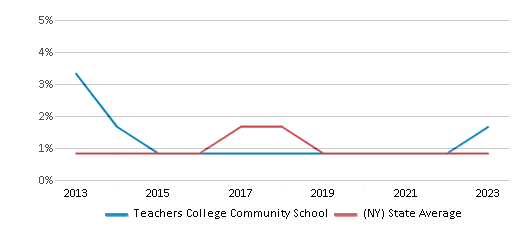
Asian
1%
10%
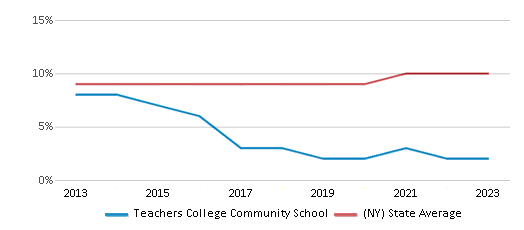
Hispanic
39%
30%
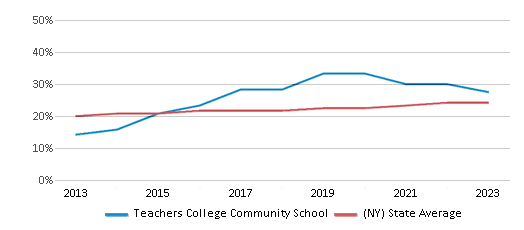
Black
45%
16%
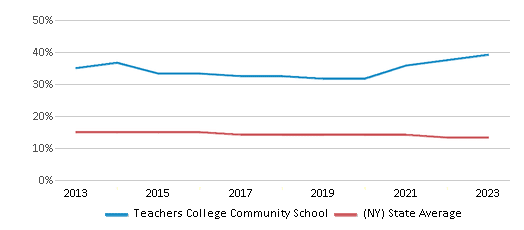
White
8%
40%
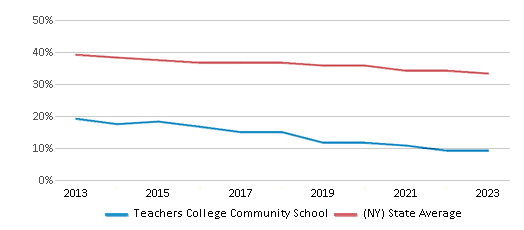
Hawaiian
1%
n/a
Two or more races
5%
3%
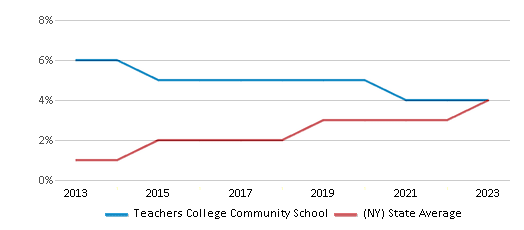
All Ethnic Groups
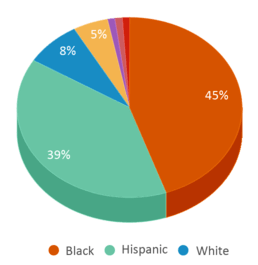
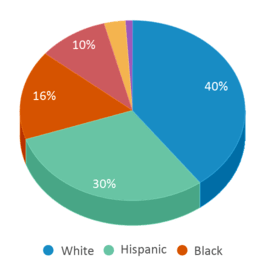
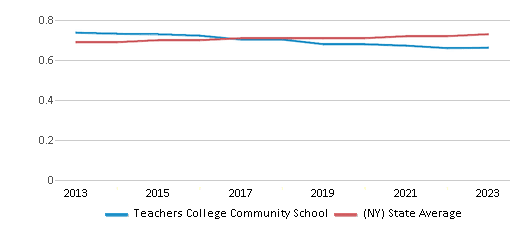
Participates in the National School Lunch Program (NSLP)
Yes
Eligible for Free Lunch
76%
54%
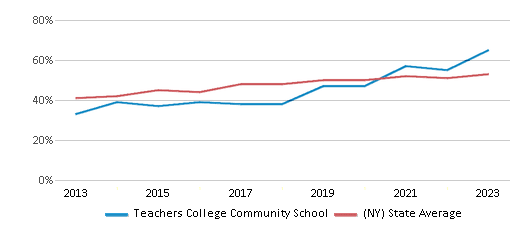
Eligible for Reduced Lunch
1%
3%
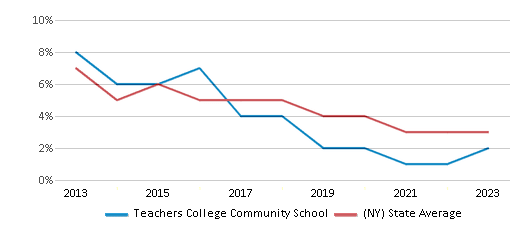
School Statewide Testing
School District Name
Source: National Center for Education Statistics (NCES), NY Dept. of Education
Profile last updated: 02/09/2025
Frequently Asked Questions
What is Teachers College Community School's ranking?
Teachers College Community School is ranked #2808 out of 4,377 schools, which ranks it among the bottom 50% of public schools in New York.
What schools are Teachers College Community School often compared to?
Teachers College Community Schoolis often viewed alongside schools like P.s. 33 Chelsea Prep, P.s. 125 Ralph Bunche by visitors of our site.
What percent of students have achieved state testing proficiency in math and reading?
30-34% of students have achieved math proficiency (compared to the 46% NY state average), while 40-44% of students have achieved reading proficiency (compared to the 49% NY state average).
How many students attend Teachers College Community School?
322 students attend Teachers College Community School.
What is the racial composition of the student body?
45% of Teachers College Community School students are Black, 39% of students are Hispanic, 8% of students are White, 5% of students are Two or more races, 1% of students are American Indian, 1% of students are Asian, and 1% of students are Hawaiian.
What is the student:teacher ratio of Teachers College Community School?
Teachers College Community School has a student ration of 12:1, which is higher than the New York state average of 11:1.
What grades does Teachers College Community School offer ?
Teachers College Community School offers enrollment in grades Prekindergarten-8 (offers virtual instruction).
What school district is Teachers College Community School part of?
Teachers College Community School is part of New York City Geographic District # 5 School District.
School Reviews
4 4/6/2019
After a rocky start, this school is moving up! great teachers.
5 11/2/2018
TCCS is improving every year and keep moving forward.We are happy family to be in this great community.
2 7/6/2015
There is a lot of hyperbole among the community and parents at TCCS. Because the school is allied with Teachers College, and consequently being touted as a superior public school, everyone involved seems to think it's fantastic. In my strong opinion, the truth is far from that.
First and most importantly, the teachers -
My kindergartner had a few good teachers, one great teacher, and a couple of mediocre ones. Unfortunately the mediocre ones were the ones whom which he spent the most time with.
I'm basing this on my direct observation of classes, as well as my son's track record. He went to a spectacularly great pre-school, has always been a stellar and hyper-focussed student in classes and private instruction, and has always loved and continues to love every educational experience he's presented with; EXCEPT for his main classes at TCCS. He liked his after-school classes presented by Teachers College graduate students, but he was bored and un-challenged with the DOE curriculum and teachers.
On more than one occasion I was told by those teachers that he needed to be "slowed down". WHAT?!?!?!?!?
To be fair, I have spoken to parents of students that had different TCCS teachers and it sounded like a completely different story. Maybe we just drew a not-so-good card.
Next, the administrative/organizational part of TCCS - the school secretary Ms H. is really great, going above and beyond the call of duty to keep the train from skidding off the rails. Almost everything else is a mess, from the after-school finances and implementation, to the field-trip notifications, to the school-lunch money collection.
Sending home daily printed notifications of school events is archaic in the era of email, texting, websites, etc etc.
In conclusion, TCCS could possibly be a good choice if you get lucky enough to get some of the better teachers, but are you willing to gamble on your child's education?
If your child is precocious, driven, advanced, an independent thinker, or any of the other things you WANT them to be, it's a long-shot that TCCS will challenge them, in my opinion.
it's probably better than the average DOE school, but most-likely not nearly as good as the vast majority if independent schools in the city.
As they are a relatively new school, I hope they can raise the bar.
We can't take the chance, so we'll be moving on for next year.
Review Teachers College Community School. Reviews should be a few sentences in length. Please include any comments on:
- Quality of academic programs, teachers, and facilities
- Availability of music, art, sports and other extracurricular activities
Recent Articles

What Is A Charter School?
Explore the world of charter schools in this comprehensive guide. Learn about their history, how they operate, and the pros and cons of this educational innovation. Discover key facts about charter schools, including admission policies, demographics, and funding, as well as what to look for when considering a charter school for your child.

10 Reasons Why High School Sports Benefit Students
Discover the 10 compelling reasons why high school sports are beneficial for students. This comprehensive article explores how athletics enhance academic performance, foster personal growth, and develop crucial life skills. From improved fitness and time management to leadership development and community representation, learn why participating in high school sports can be a game-changer for students' overall success and well-being.

February 05, 2025
Understanding the U.S. Department of Education: Structure, Impact, and EvolutionWe explore how the Department of Education shapes American education, from its cabinet-level leadership to its impact on millions of students, written for general audiences seeking clarity on this vital institution.









